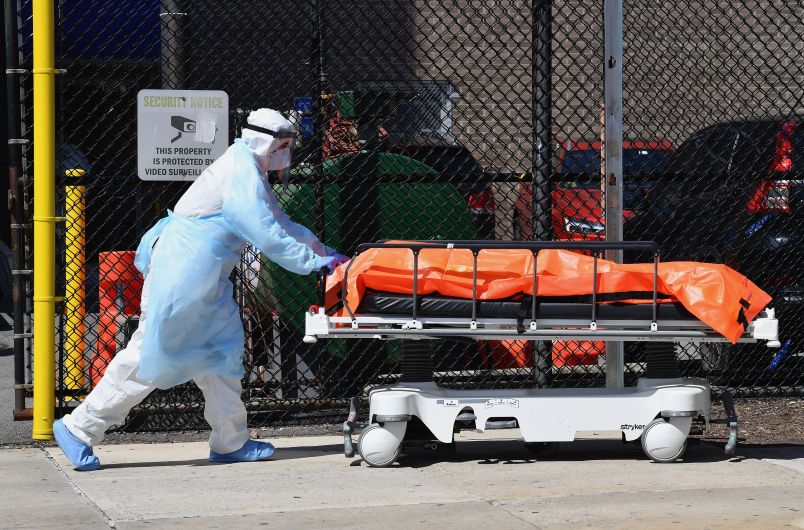Americans are facing dramatically more problems in getting access to health care as the COVID pandemic rages on, according to a new study.
The issues range from simple access to in-person doctor visits to what the study describes as medication rationing, leaving people with serious illnesses either unable to fill their prescriptions or forced to take them in lesser doses to prolong their supply.
Health measurement firm Evidation Health collected the data as part of a study it’s been running called COVID-19 Pulse, tracking the myriad effects of the pandemic and the knock-on effects of the attempts to contain its spread.
The company runs an app called Achievement, in which users can earn cash rewards for logging or performing health-related activities. Evidation is using the app as a platform for the ongoing survey, asking users to answer questions about their experience of the pandemic.
This latest batch of data – collected from March 31 to April 8 – includes results from more than 88,000 respondents, the firm said.
Data from the latest report – released Thursday morning – suggests that many Americans are facing difficulties in seeing doctors when they need them.
One in three respondents in the study said that over the past two weeks they have been unable to schedule an in-person doctor’s appointment.
The study suggests that similar problems are appearing in medication. While 7 percent of the study’s respondents said that they were unable to fill their prescription, 18 percent of fibromyalgia patients and 13 percent of type 2 diabetes patients reported that they either were forced to stop taking their medications as prescribed or outright were unable to get the drugs.
The data comes as cities around the country begin to grapple with the death toll from COVID-19, and as researchers start to begin the lengthy process of determining how many people died directly and indirectly from the pandemic.
While it’s understood that many have likely died of COVID without ever having been diagnosed, the flooding of certain hospitals and longer ambulance times likely mean that some people are dying of treatable illnesses. Alternatively, people who put off visits to the doctor’s office may find themselves battling a more serious malady than they initially thought, leaving them in worse place to confront whatever illness they may have.
The study does not address this directly, but does suggest that those with chronic health conditions are having a tough time accessing health care services.
For example, the researchers found that 44 percent of cancer survivors or those currently being treated for it have been unable to see their doctor in person over the past two weeks. Fifty-four percent of fibromyalgia patients can’t see a doctor, while 44 percent of those with arrhythmia also cannot.
The pandemic has also cast a cloud over visiting any doctor, with people reporting that they are worried enough about going to what the report describes as a “medical setting” to forego care.
Of those with Type 2 diabetes – who are at elevated risk for serious complications from COVID – 55 percent expressed some level of worry about being exposed to COVID while seeking care. Twelve percent of them were worried enough to forego care.
And, 18 percent of respondents with fibromyalgia said that they were so worried about potential COVID exposure that they would forego care.
One relatively bright spot revolves around telehealth, the kind of remote health care that has been championed since the pandemic began as a way for doctors to diagnose patients without exposing themselves to the contagion.
While the study found that 60 percent of all respondents who had been unable to see a provider in person were not replacing that with a telehealth appointment, it did collect data suggesting that those with chronic illnesses were nearly 60 percent more likely to have found a remote health care provider.
This article has been corrected to clarify that 55 percent of respondents with type 2 diabetes expressed worry about potential exposure to COVID, and that a smaller percentage were choosing to forego care as a result.







We have a elderly neighbor who had to schedule an appointment to find out when he could get an appointment. It’s really a bad time to be an old.
True dat -
They still have their full shifts at the blood lab in St. Paul for the Red Cross, but there’s no more overtime because elective surgeries are postponed until this all lifts.
Other advanced countries have healthcare systems - we have a loose conglomeration of for-profit treatment centers that cater to people who can pay, either cash on the barrel head or insurance. Nothing has so quickly brought out the disparity of those who have concierge type healthcare versus the majority who have some kind of basic insurance versus those who have absolutely nothing to help them or back them up at this time. The pandemic is going to split this country into pieces and the healthcare “system” is just the first piece to break off and go floating away - the next piece will be the mortgage/rent system that is going to crack - then the insurance companies, then the credit companies - you get the picture. We already know 2 couples with young children who are facing possible homelessness within the next month.
Once again the poorest of us all are going to pay the biggest price for the sins of the wealthy in this country.
My sister fits this category. She continues on oral chemo but has not seen her oncologist in at least a month maybe longer. Her chemo is delivered by mail. If the USPS folds there will be a transition to a private carrier but who knows how long that will take.
It’s almost like the GOP had this all planned out…
Cunning bastards…